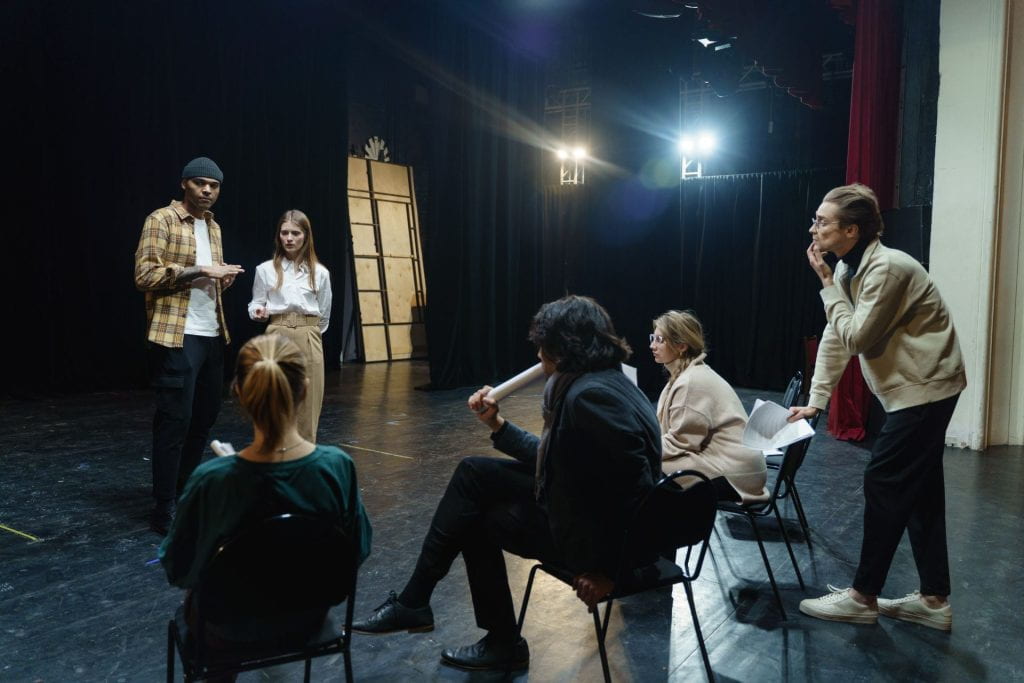By Devon Coutts
Ph.D. Candidate, Philosophy
Devon.coutts@stonybrook.edu
It can be especially difficult for university faculty members to develop effective teaching skills. While we all invest a great deal of time and energy in learning our respective disciplines, many, if not most, of us are not given any kind of guidance for how to pass on learning to our students. Perhaps surprisingly, such guidance need not come from traditional educational theory; there is a lot we can learn about teaching from the performing arts.

That was certainly the case for me when I taught a class for the first time. I approached preparing my classes the way I would have approached preparing for a performance. I wrote out detailed scripts for myself and rehearsed giving lectures. I included “stage notes” for myself to indicate slide transitions, points of emphasis, the questions I planned on asking the students, and the questions that I anticipated students would ask me as we went along. While this method of preparation helped me to feel more confident going into the classroom, it was rare that a class ever played out exactly the way that I had envisioned it. This is because I assumed that my students would be a model audience, when in fact, I should have been thinking about them as my fellow actors. In my experience, the most effective and engaging classes were the ones in which students took an active role in guiding the lesson: where they asked questions, responded to one another, and made new connections within and beyond our course readings.
Comparisons between teaching and the performing arts have been around since at least the 1960’s. In his 1968 article, “Qualitative intelligence and the act of teaching,” Elliot W. Eisner writes, “Teachers, like actors, attempt to communicate to groups of people in an audience-like situation . . . both the actor and the teacher employ qualities to enhance communication [and] must be able to control their actions in such a way as to capture the attention and interest of those to whom their message is directed.” In other words, for both teachers and actors, the mode of delivery is as important as the content being expressed. Although the goals of acting and teaching differ greatly, both employ similar means toward achieving them.
For instance, one professor, Aaron Langille, who teaches in mathematics and computer science at Laurentian University, shared six strategies that he uses in his classroom teaching:
- Voice dynamics: Practice projecting techniques, and varying tone and intonation to convey enthusiasm.
- Eye contact: Rather than reading from notes or slides, this helps you to connect with your students.
- Audience involvement: Build in ways of inviting students to share their ideas or generate their own examples in every class.
- Pop culture: Try to bring in relevant examples, either by asking students directly or by giving them ways to bring what’s important or interesting to them to class discussions. For example, Langille creates meme threads for students to post memes relevant to the course material.
- Humor: Remember to tread with caution when it comes to humor: keep things light, try to avoid excessive sarcasm, and always be willing to laugh at yourself.
- Improvisation: Try the “yes, and . . .” strategy, remember to go with the flow, stay flexible and open to surprises or new avenues of thinking that may pop up.
Langille reported that by working on his vocal dynamics and improvisation in particular, he was able to communicate his course material more effectively and with genuine enthusiasm. Bringing these certain performance elements into his teaching thus also helped him show care and concern for his students as learners, which in turn invited them to become “actors” guiding their own learning.
Some professors take the “teaching as performance” idea even further. As Noha Fikry writes in this first person article published on the website for the Society for Cultural Anthropology. Fikry quotes her former professor from the American University of Cairo, AbdelAziz EzzelArab (“Zizo”), who says: “Teaching is all about performance . . . it takes passion and performance skills.” For her mentor, Zizo, teaching “requires an active engagement with every muscle of your body, along with full and undivided attention through which a teacher plays with and builds on student engagements to inform class content and discussions.” The actual content of the lessons, for Zizo, take on secondary importance, but his dedication to his students seems to ensure that learning does not suffer as a result. Reflecting on her own experience of being Zizo’s student, Fikry writes, “Zizo’s intense passion, overwhelming presence, and wholesome engagement in class . . . captivated my entire being to remain fully focused.”
It might not be possible for all of us to embody our teaching as fully as Zizo, but we can all benefit from incorporating certain performance techniques in the classroom. Even something as simple as making eye contact, rather than reading from notes, and trying out variations in tone and pace while giving a lecture can make a huge difference to how students respond to the material, the instructor, and to one another. What is more, bringing in techniques of improvisation helps to make space for students to become like actors themselves, and to take an active role in guiding their own learning.
References
De La Vega, V. (2019). Teaching as performance. Centre for Teaching, Learning and Technology. The University of British Columbia. Retrieved from https://ctlt.ubc.ca/2019/10/30/teaching-as-performance/
Eisner, E. W. (1963). Qualitative intelligence and the act of teaching. Elementary school journal, 63(6), 299-307.
Fikry, N. (2022). Teaching as performance: On scripts, preparing for classes, and teaching with passion. Society for Cultural Anthropology. Retrieved from https://culanth.org/fieldsights/teaching-as-performance-on-scripts-preparing-for-classes-and-teaching-with-passion
